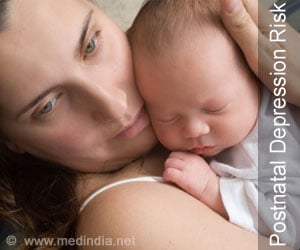Who are at a higher risk of developing postnatal depression (PND)? Mothers who give birth to boy babies are at a higher risk of developing depression symptoms after childbirth, reveals a new study.

‘Who are at a higher risk of developing postnatal depression (PND)? Mothers who give birth to boy babies are at a higher risk of developing depression symptoms after childbirth, reveals a new study.’
Read More..




Overall the researchers identified that women who give birth to males are 71-79 percent more likely to develop PND. Furthermore, women whose births had complications were 174 percent more likely to experience PND compared to those women who had no complications.Read More..
As a result of their findings, Dr Sarah Johns and Dr Sarah Myers in the University's School of Anthropology and Conservation (SAC), conclude that recognising that both male infants and birth complications are PND risk factors should help health professionals in identifying and supporting women who may be more likely to develop this condition.
Their research also showed that while women with a tendency towards symptoms of depression, anxiety, and stress were always at increased risk of PND, they had reduced odds of developing PND after experiencing birth complications. This is likely because these women may receive greater post-birth support because their mental health concerns were previously recognized. This finding suggests interventions to support women can be effective in preventing PND developing.
Dr. Johns said: 'PND is a condition that is avoidable, and it has been shown that giving women at risk extra help and support can make it less likely to develop. The finding that having a baby boy or a difficult birth increases a woman's risk gives health practitioners two new and easy ways to identify women who would particularly benefit from additional support in the first few weeks and months'
Dr. Johns and Dr. Myers decided to assess whether there was a relationship between the sex of infants and PND because of the known link between inflammatory immune response and the development of depressive symptoms.
Advertisement
Many known risk factors for depressive symptoms are associated with activation of inflammatory pathways, opening up the potential for identifying new risk factors based on their inflammation causing effects - an idea supported by this study.
Advertisement
Source-Eurekalert















